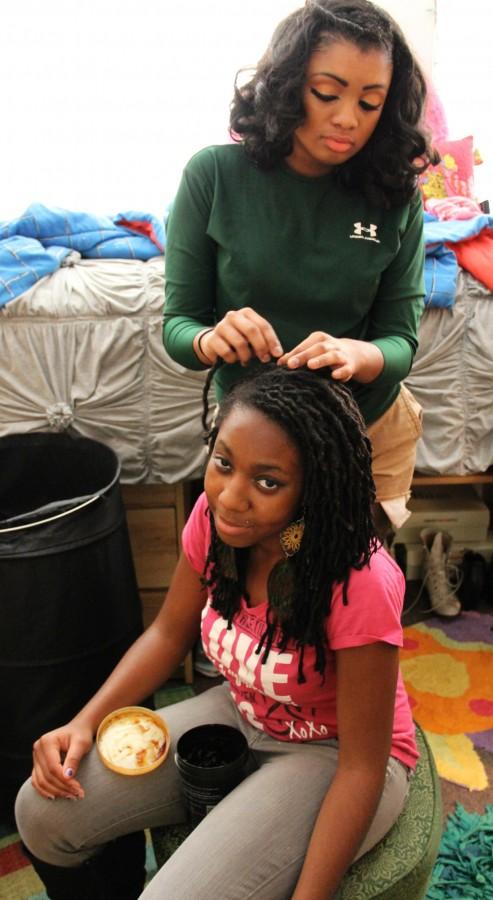For many black women in America,
hair straightening is inevitable. Whether with chemicals or heat, curls have been pressed, tamed and strapped down. Natural afros have been traded in for long, straight tresses.
But some women at Loyola have steered clear of any chemical straightening processes, such as perms or relaxers. They are part of a growing trend of women who refuse to use chemicals and choose to rock their hair in its natural state.
“I’ve always had natural hair,” music industry senior Britti Guerin said. “Since I was a little girl.”
Hair that has not been processed by chemicals and is worn in its natural state is considered “natural hair” in the black community. For those with a tight curl pattern, like many in the black community, hair care is much easier said than done. A loose curl pattern usually equates to waves or ringlets. Tighter curl patterns are more often found with afros. Those with natural hair make the decision to not use chemicals that would alter the curl pattern in order to make the hair straighter.
Guerin recalls an experience that forever changed her hair.
“My hair used to be extremely long when I was a little girl. I used to look like a cocker spaniel when they used to blow dry it,” Guerin said. But one day, a common activity changed that.
“It ended up breaking off. I went swimming with my friend; she was white with really long red hair. And we went swimming in her grandma’s swimming pool, and her grandma didn’t measure how much chlorine she put into the swimming pool, which was really damaging for my hair.”
Though a swimming cap would have protected against damage, Guerin remembers refusing to wear one because she wanted to fit in with her friends.
“I didn’t want to wear the swimming cap,” Guerin said. “I wanted to look pretty, to wear my hair out like all my friends.”
The makeup of natural and black hair generally makes it more fragile than most types of hair, so Guerin’s experience is not unique within the black community.
“As I got older, I would straighten my hair. I thought straightening my hair would make me look more sexy,” Guerin said. “It made me look older. But I would straighten it so much that I would ruin my curl pattern.”
While some naturals are comfortable wearing their hair out, others receive negative backlash for having a style that seems unusual by society’s standards.
“My friends have huge afros,” Guerin said. “One of my friends was at her internship and she had her hair really big. And this guy came up and was like, ‘What’s going on with your hair?'”
Having an afro, or wearing natural hair in a big way, could garner attention from those who aren’t used to it.
“People look because they’re amazed,” Guerin said. “It intrigues people. There’s going to be ignorance. Everybody was shaped or molded differently. I never pay attention to people’s opinions, because I do it for me.”
Sociology sophomore Eli Green has been natural since high school but more recently has decided to lock her hair. Locks, which are sometimes referred to as dreads or dreadlocks, are also a popular style amongst natural hair enthusiasts.
“I decided to stop getting relaxers February of my freshman year,” Green said. “For various reasons, one being that I had a lot of breakage just from chemicals and products that I was using. So I decided to completely cut that out.”
“I’m not the only person locked in my family. My sister has locks, my brother has locks as well,” she said.
Though Green has not received negative backlash for wearing locks, she finds that most comments stem from wonder.
“All the time, people are curious,” Green said. “People always have questions.”
Curiosity stems from people of any race. Even within the black community, natural hair is an unknown concept for some.
“My grandparents on my mom’s side just really didn’t know what it was,” Green said. “Less of a criticism and more of confusion.”
As the natural hair phenomenon begins to spread further into college culture, Guerin fears that those who choose to chemically alter their hair may feel the fury of those who choose to stay natural.
“I don’t think it’s right when people are criticized for not having natural hair,” Guerin said. “Lately it’s become a trend. It’s so big now.”
Guerin wears her hair naturally but also chooses to include hairpieces that change her look. Including extensions gives her the freedom to transform her style as she sees fit. She admits that this type of maintenance isn’t for everyone.
“My outer fits my personality,” Guerin said. “People should just be who they are.”
Whether it’s an afro, braids, extensions or locks, the natural hair community is growing at Loyola.
“Natural hair doesn’t necessarily mean curly,” Guerin said. “It can mean kinky, and kinky is beautiful.”







